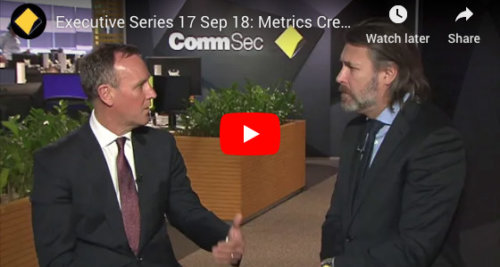Corporate loan market yields to non bank funders
Banking Day, 26 September 2019
Record low deposit rates and falling bond yields, along with reduced risk appetite for lending to the commercial property sector, have seen investors switch to non-bank corporate lenders.
Metrics Credit Partners, which claims to be Australia’s largest non-bank lender to the corporate sector has seen its loan portfolio double in the past two financial years.
The firm, which started with A$75 million in initial capital six years ago, now manages more than A$5 billion in current loans with more than 130 entities.
Managing partner Andrew Lockhart stated at a media presentation in Sydney yesterday that his firm is the first non-bank lender able to raise capital directly from superannuation funds (along with other institutional and wholesale investors, charities and universities.)
Lockhart also said 34 per cent of his firm’s lending portfolio is directed to commercial property transactions as a result of banks pulling back from the sector, under pressure from prudential regulator APRA.
Metrics has also taken an equity interest in two non-bank financial services players, one a residential mortgage provider and the other a motor vehicle finance firm.
On the other side of the balance sheet, Metrics’ target loan market is large diversified entities, either via secured debt (which accounts for 80 per cent of Metrics’ investments) as part of a syndicated loan, or as more aggressive mezzanine debt.
For instance, Metrics Partners is working with private equity firm Anchorage “and one other lender” to provide funding for an acquisition, although Lockhart was coy about the client.
Metrics’ list of corporate borrowers includes ASX heavyweights such as Woolworths, Patrick Terminals and Origin Energy. (Metrics participated in a $550 million syndicated loan to Origin Energy in February this year).
Lockhart also took aim at what he considers unethical conduct by some of his competitors, particularly those lending to the unrated property development sector.
He said those lenders were facilitating deception on the part of a borrower by encouraging nondisclosure of mezzanine debt, which has been disguised as “an unregistered second ranking charge”, to the detriment of first-ranking secured creditors.
“It is a poor market practice for two reasons: a borrower has an obligation to disclose [a second mortgage] to a bank or secured creditors; and, this [action] makes it very difficult for investors, as any securities held in escrow and not disclosed until a default when they seek to register a mortgage was likely to be challenged by an administrator,” Lockhart said.
“Our concern is that those lenders are achieving the same returns [as us] but we are taking a lower risk.”
Other News
Graham McNamara to Retire as Managing Partner
Metrics Credit Partners (“Metrics”) today announced that Managing Partner Graham McNamara has advised the Board of his intention to retire,…
MCP Master Income Trust (ASX:MXT) successfully raises $315m in wholesale placement
Metrics Credit Partners is pleased to announce that Metrics Master Income Trust (ASX: MXT) will resume trading today following the…
INSIGHTS
MCP Income Opportunities Trust (MOT) lists on ASX
Sydney, 29 April 2019: The Trust Company (RE Services) Limited (ABN 45 003 278 831) (Responsible Entity) is the responsible…
MCP Master Income Trust wins Lonsec Listed Fund Award
The award came a year after MXT was listed on the Australian Securities Exchange






